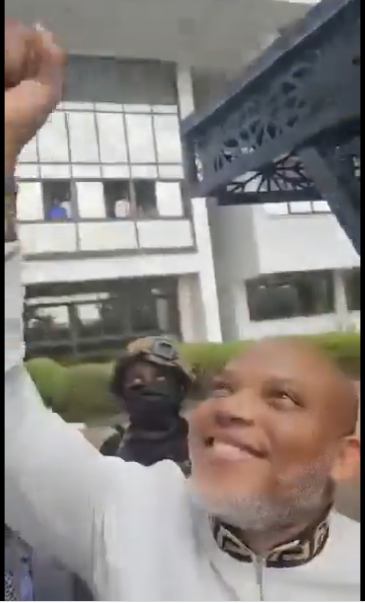
Mazi Nnamdi Kanu Files Powerful Legal Brief Challenging Trial Under Repealed Law, Citing Constitutional Supremacy of Section 36(12)
“This Constitution is supreme and its provisions shall have binding force on all authorities and persons throughout the Federal Republic of Nigeria.” Mazi Nnamdi Kanu Reminds Justice Omotosho.
Abuja, Nigeria – November 19, 2025
Nigeria’s long-running prosecution of Mazi Nnamdi Kanu has once again exposed deep fractures in Nigeria’s justice system, where constitutional guarantees are routinely ignored, leading the judiciary to violate its own constitution with impunity.
At the center of this legal battle is Kanu’s newly filed constitutional brief, dated November 18, 2025, which decisively argues that no Nigerian court can try him under a law that no longer exists.
Despite filing multiple motions challenging the legality of his prosecution, particularly the fact that the charges against him rest on a repealed law, the trial judge has failed to issue rulings, leaving critical constitutional questions unanswered.
This judicial silence, coupled with the refusal to hear his motion to dismiss all charges, reflects a disturbing pattern in which legal processes stall whenever an ordinary Nigerian seeks justice.
Having been abducted in Kenya and extraordinarily renditioned to Nigeria in June 2021, Kanu has remained in detention despite a unanimous Court of Appeal judgment in 2022 discharging him and terminating all proceedings.
Instead of obeying that ruling, the State has attempted to revive charges under a statute that no longer exists in Nigeria’s body of extant laws.
The continued detention of a defendant without a valid subsisting charge, trial, or lawful court order has deepened public concerns that the rule of law has been subordinated to political considerations, eroding confidence in the integrity of Nigeria’s judicial institutions.
While held in DSS custody, Kanu reported attacks on his life and dehumanizing conditions, further heightening concerns over the state-sponsored violations.
His most recent lawsuit against the Nigerian Medical Association and ten medical practitioners, whom he accuses of falsifying medical reports used to deny him proper medical care, highlights a wider breakdown of professional ethics and institutional independence.
The constitutional issues raised by this case go beyond the fate of one man. They speak to the failed Nigerian system that has affected all it’s institutions, especially the courts, the last hope of the common man.
The court itself have refused to uphold the supremacy of the Constitution over repealed statutes, and has fallen to executive pressure, and adopted procedural improvisation.
The Defence argues that Section 36(12) of the Constitution, which forbids prosecution under non-existent laws, is absolute and cannot be sidestepped through “savings clauses” or judicial remittals.
If the fundamental guarantees of legality, due process, and judicial finality can be ignored in the case of Mazi Nnamdi Kanu, they can be ignored for any citizen.

Around the world, protests continue to grow, demanding his immediate release and condemning Nigeria for weaponizing the courts, healthcare system, and security agencies against a single individual who has already been discharged by the Court of Appeal.
The urgent test before the judiciary is whether it will reaffirm constitutional supremacy, or permit its erosion through circumvention and executive impunity.
Mazi Nnamdi Kanu’s newly filed brief highlights the supremacy of Section 36(12) of the Constitution, the illegality of relying on repealed statutes, and the impossibility of reviving extinguished proceedings through judicial remittal.
Collectively, these failures, judicial inaction, unconstitutional prosecution, violent detention, and professional misconduct paint a haunting picture of a justice system unwilling to submit to the very Constitution it is sworn to uphold. The full legal brief is reproduced below:
FORMAL LEGAL BRIEF
IN THE FEDERAL HIGH COURT OF NIGERIA
HOLDEN AT ABUJA
SUIT NO: FHC/ABJ/CR/383/2025
BETWEEN:
FEDERAL REPUBLIC OF NIGERIA ……. COMPLAINANT
AND
MAZI NNAMDI KANU…. DEFENDANT
LEGAL BRIEF ON THE SUPREMACY OF SECTION 36(12) CFRN AND THE UNCONSTITUTIONALITY OF PROSECUTIONS UNDER REPEALED STATUTES DESPITE SAVINGS CLAUSES
1. INTRODUCTION
This legal brief addresses a fundamental constitutional question: whether the Defendant can be prosecuted under a repealed statute, the Terrorism Prevention Act 2011/2013, in light of the overriding force of Section 36(12) of the Constitution of the Federal Republic of Nigeria (1999 as amended).
The Defence submits that the answer is unequivocally NO.
Section 36(12) CFRN, embodying nullum crimen sine lege, prohibits prosecution or conviction except under extant written law. A repealed statute is not “written law” within this constitutional requirement. Savings clauses cannot resurrect a repealed statute, nor can they override constitutional supremacy under Sections 1(1) and (3).
2. ISSUES FOR DETERMINATION
Whether Section 36(12) CFRN prohibits the prosecution of the Defendant under a repealed statute that was not extant at the time of trial.
Whether the savings clause in Section 98(3) of the Terrorism Prevention and Prohibition Act (TPPA) 2022 can constitutionally sustain a fresh trial after repeal.
Whether proceedings in this case were “pending” at the time of repeal, having been fully discharged by the Court of Appeal.
Whether a case extinguished by the Court of Appeal and founded on a repealed law can be remitted for trial by the Supreme Court.
3. CONSTITUTIONAL SUPREMACY
Section 1(1) CFRN provides:
“This Constitution is supreme and its provisions shall have binding force on all authorities and persons throughout the Federal Republic of Nigeria.”
Section 1(3) adds:
“If any other law is inconsistent with the provisions of this Constitution, this Constitution shall prevail, and that other law shall, to the extent of the inconsistency, be void.”
Where a savings clause (Section 97, 98(3) TPPA & S.6 Interpretation Act) purports to sustain a criminal proceeding on a dead law contrary to Section 36(12), the clause is void to the extent of its inconsistency.
4. SECTION 36(12) CFRN: A NON-DEROGABLE CONSTITUTIONAL COMMAND
Section 36(12) CFRN states:
“…a person shall not be convicted of a criminal offence unless that offence is defined and the penalty therefor is prescribed in a written law…”
A repealed statute is no longer “written law.” The Supreme Court has consistently held:
Abacha v. State (2002) — conviction without an extant written law is a statutory nullity.
Aoko v. Fagbemi (1961) — a repealed law is dead and cannot sustain prosecution.
Boniface Adonike v. State (2015) — conviction under a repealed statute is per incuriam and void.
Accordingly, no repealed law can ground a criminal trial unless proceedings were genuinely pending at the moment of repeal.
5. NULLUM CRIMEN SINE LEGE
The doctrine forbids:
prosecutions under extinguished statutes,
retroactive criminalisation,
analogical expansion of offences,
reliance on repealed law to found new proceedings.
Section 6 of the Interpretation Act cannot revive:
fresh charges,
new proceedings,
de novo trials,
appeals after discharge,
repealed statutes.
Interpretative provisions do not trump constitutional guarantees.
6. THE COURT OF APPEAL DISCHARGE EXTINGUISHED ALL PROCEEDINGS
On 13 October 2022, the Court of Appeal, per Oladotun Adefope-Okojie, JCA, delivered the decision discharging the Defendant and extinguishing the proceedings.
From that moment:
there was no pending charge,
no subsisting trial,
no existing proceeding capable of being “saved,”
no legal platform upon which the repealed Terrorism Act could rest.
Thus, when the TPPA 2022 repealed the earlier Terrorism Prevention Act, the case was not pending. The repeal met an extinguished proceeding, not a live one.
A savings clause cannot save what does not exist.
7. THE SUPREME COURT’S REMITTAL WAS PER INCURIAM
On 15 December 2023, the Supreme Court purported to remit the case for trial. However:
the underlying statute had been repealed,
the original proceedings had been extinguished by the Court of Appeal,
Section 36(12) prohibits prosecution under repealed law,
constitutional supremacy overrides judicial remittal.
A remittal cannot breathe life into a dead statute or restore proceedings that were lawfully extinguished. The Constitution prevails over any remittal order inconsistent with Section 36(12).
8. LORD CAMDEN’S DICTUM
In Entick v. Carrington (1765):
“If it is law, it will be found in our books. If it is not to be found there, it is not law.”
The repealed Terrorism Prevention Act 2011/2013 is not law. It is not in the books of the laws of Nigeria as extant legislation. It is dead and cannot ground jurisdiction. A dead law cannot be used to try a man who is living. A living law tries a living man. That is common sense.
9. SAVINGS CLAUSES CANNOT OVERRIDE THE CONSTITUTION
Savings clauses cannot:
revive repealed laws,
sustain fresh trials,
override discharge by the Court of Appeal,
contradict Section 36(12) CFRN,
create jurisdiction where none exists.
The Constitution prohibits prosecution under non-existent statutes like Terrorism Prevention Amendment Act 2013, Criminal Code Act Cap C45 or Customs Excise Management Act. They are all dead or non-existent and therefore are not living, written or extant laws. The Constitution of Nigeria says you cannot use it to prosecute anyone.
10. CONCLUSION
This Honourable Court is bound to uphold the Constitution and must therefore find:
The repealed Terrorism Prevention Act 2011/2013 is not extant written law;
Section 98(3) TPPA 2022 cannot apply to proceedings extinguished by the Court of Appeal;
The Supreme Court’s remittal cannot override Section 36(12);
The present charge is a nullity.
The Defence respectfully prays for:
AN ORDER striking out the charge in its entirety for being unconstitutional, incompetent, and a nullity ab initio.
DATED THIS 18th DAY OF NOVEMBER 2025
MAZI NNAMDI KANU
Defendant/Applicant Appearing in Person
FOR SERVICE ON:
ATTORNEY-GENERAL OF THE FEDERATION